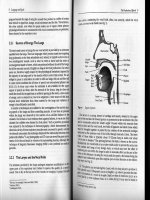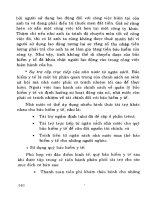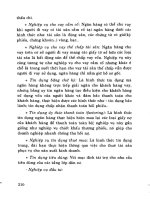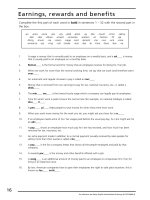practise english toeic cambrigh 3 docx
Bạn đang xem bản rút gọn của tài liệu. Xem và tải ngay bản đầy đủ của tài liệu tại đây (208.36 KB, 6 trang )
1. Word classes: nouns, verbs, adjectives, etc
A Introduction
Look at the different kinds of word in this sentence.
Pronoun Verb Determiner Adjective Noun Preposition Noun Adverb
I
have an
important conference at
work tomorrow,
Linking word Pronoun Verb Adverb Adjective
So
I
am rather busy.
B What kind of word?
There are eight different kinds of word in English. They are called 'word classes' or 'parts of speech'. Here are
some examples from the conversations in the cafe. The numbers after the examples tell you which units in
the book give you more information. 1 Verb: have, am, is, would, like, come, are, sitting, look 4-75
Noun: conference, work, coffee, party, Saturday, Jessica, friends, corner 76-82
Adjective: important, busy, good, cheap 104-109
Adverb: tomorrow, rather, really, here 113-117
Preposition: at, to, on, in 118-125
Determiner: an, this, our, the 83-97
Pronoun: I, it, you 98-103
Linking word: so, and 150-153
C Words in sentences
Some words can belong to different classes depending on how they are used in a sentence.
VERBS
Can I look at your photos? We
work on Saturday morning.
NOUNS
I like the look of that coat.
I'll be at work tomorrow.
1 Exercises
1 What kind of word? (B)
Read this paragraph and then say which word class each underlined word belongs to. To help you decide,
you can look back at the examples in B.
Andrew didn't go to the cafe with the other students. Rachel told him they were going there, but he wanted
to finish his work. Andrew isn't very sociable. He stays in his room and concentrates totally on his studies.
He's an excellent student, but he doesn't have much fun.
?
to
preposition
7 sociable
?
cafe
noun
8 in ………………………
1
the………………………….
9
and …………………….
2
told…………………………
10
totally …………………….
3
they……………………….
11
an ………………………
4
there …………………….
12
excellent …………………….
5
he …………………………
13
but ……………………
6
finish ……………………
14
fun …………………
2 What kind of word? (B)
Read this paragraph and then write the words in the spaces below. Write the first three verbs under 'Verb', and
so on. Do not write the same word more than once.
Henry thinks Claire is wonderful. He loves her madly, and he dreams of marrying her, but unfortunately he
is rather old for her. Today they are at a cafe with their friends Sarah and Mark, so Henry can't get romantic
with Claire. But he might buy her some flowers later.
Verb
Noun
Adjective
Adverb
think
Henry .
Preposition
Determiner
Pronoun
Linking word
3 Words in sentences (C)
Is the underlined word a verb, a noun or an adjective?
?
Shall we go for a walk?
noun
?
Shall we walk into town?
verb
1
Laura wanted to talk to Rita.
2
Laura wanted a talk with Rita.
3
The windows aren't very clean.
4
Doesn't anyone clean the windows?
5
We went to a fabulous show in New York.
6
Laura wanted to show Rita her photos.
7
Henry thought Claire looked beautiful.
8
A strange thought came into Emma's head.
9
Sarah is feeling quite tired now.
10
Studying all night had tired Andrew out.
2. Sentence structure: subject, verb, object, etc
Sentence structure
The parts of a sentence are the subject, verb,
object, complement and adverbial. A statement
begins with the subject and the verb. There are
five main structures which we can use to make
a simple statement.
1 SUBJECT VERB
My arms are aching.
Something happened.
2 SUBJECT VERB OBJECT
/ need a rest.
Five people are moving the piano.
The subject and object can be a pronoun
(e.g. I) or a noun phrase (e.g. the piano).
3 SUBJECT VERB COMPLEMENT
This piano is heavy.
It was a big problem.
The complement can be an adjective (e.g.
heavy) or a noun phrase (e.g. a big problem).
The complement often comes after be. It can
also come after appear, become, get, feel, look,
seem, stay or sound. For adjectives and word
order see Unit 104B.
4 SUBJECT VERB ADVERBIAL
It is on my foot.
Their house is nearby.
An adverbial can be a prepositional phrase
(e.g. on my foot) or an adverb (e.g. nearby).
5 SUBJECT VERB OBJECT OBJECT
It s giving me backache.
David bought Melanie a present.
We use two objects after verbs like give and
send (see Unit 3).
B Adverbials
We can add adverbials to all the five main structures. My arms are aching
terribly. I really need a rest. Of course this piano is heavy. Fortunately
their house is nearby. To everyone's surprise, David actually bought Melanie
a present yesterday.
34, 36 Word order in questions 113 Adverbs and word order page 377 Seem, look etc in American English
2 Exercises
1 Parts of the sentence (A)
Mike and Harriet are on holiday. They have written a postcard to David and Melanie. Look at each
underlined phrase and say what part of the sentence it is: subject, verb, object, complement or adverbial.
► We're having a great time. object
1 The weather is marvellous. 4 We're on a farm.
2 We really enjoy camping. 5 We like this place.
3 It's great fun. 6 The scenery is beautiful.
2 Sentence structure (A)
After moving the piano, the five friends had a rest and a cup of tea.
Look at this part of their conversation and then write the letters a)- e) in the correct place.
a
David: That was a difficult job.
b
Tom: I agree.
c
Mike: I'm on my deathbed.
d
David: Someone should give us a medal.
e
Harriet: I've made some more tea.
► Subject + verb b
1 Subject + verb + object
2 Subject + verb + complement
3 Subject + verb + adverbial
4 Subject + verb + object + object
3 Word order (A)
Put the words in the correct order and write the statements.
► is / Melanie / very nice Melanie is very nice.
1 football / likes / Tom ………………………………………………
2 an accident / David / had ………………………………………………
3 moved / the piano / we ………………………………………………
4 a tall woman / Harriet / is ………………………………………………
5 sat / on the floor / everyone ………………………………………………
6 gave / some help / Mike's friends / him
4 Adverbials (B)
These sentences are from a news report. Write down the two adverbials in each sentence.
Each adverbial is a prepositional phrase or an adverb.
► Prince Charles opened a new sports in Stoke
centre in Stoke yesterday. yesterday
1 He also spoke with several young
people.
2 The sports centre was first
planned in 1994.
3 Naturally, the local council could not
finance the project without help.
4 Fortunately, they managed to obtain
money from the National Lottery.
3 Direct and indirect objects
A Introduction
Henry gave Claire some flowers. Here the verb
give has two objects. Claire is the indirect object,
the person receiving something. Some flowers is
the direct object, the thing that someone gives.
Here are some more examples of the two structures.
INDIRECT OBJECT DIRECT OBJECT
Emma gave Rachel a CD.
I'll send my cousin a postcard.
We bought all the children an ice-cream.
DIRECT OBJECT
Emma gave the CD I'll
send a postcard We
bought ice-creams
PHRASE WITH TO/FOR
to Rachel.
to my cousin.
for all the children.
B To or for?
We give something to someone, and we buy something for someone.
We can use to with these verbs: bring, feed, give, hand, lend, offer, owe, pass, pay,
post, promise, read, sell, send, show, take, teach, tell, throw, write
Vicky paid the money to the cashier, OR Vicky paid the cashier the money. Let
me read this news item to you. OR Let me read you this news item. We showed
the photos to David, OR We showed David the photos.
We can use for with these verbs: book, bring, build, buy, choose, cook,
fetch, find, get, leave, make, order, pick, reserve, save
They found a spare ticket for me. OR They found me a spare ticket.
I've saved a seat for you. OR I've saved you a seat.
Melanie is making a cake for David, OR Melanie is making David a cake.
C Give + pronoun
Sometimes there is a pronoun and a noun after a verb such as give.
The pronoun usually comes before the noun.
Henry is very fond of Claire. He gave
her some flowers.
We use her because Claire is mentioned earlier. Her
comes before some flowers.
Henry gave some flowers to Claire. Here give
has a direct object (some flowers) and a phrase
with to. To comes before Claire, the person
receiving something.
Henry bought some flowers. He gave
them to Claire.
We use them because the flowers are mentioned
earlier. Them comes before Claire.









